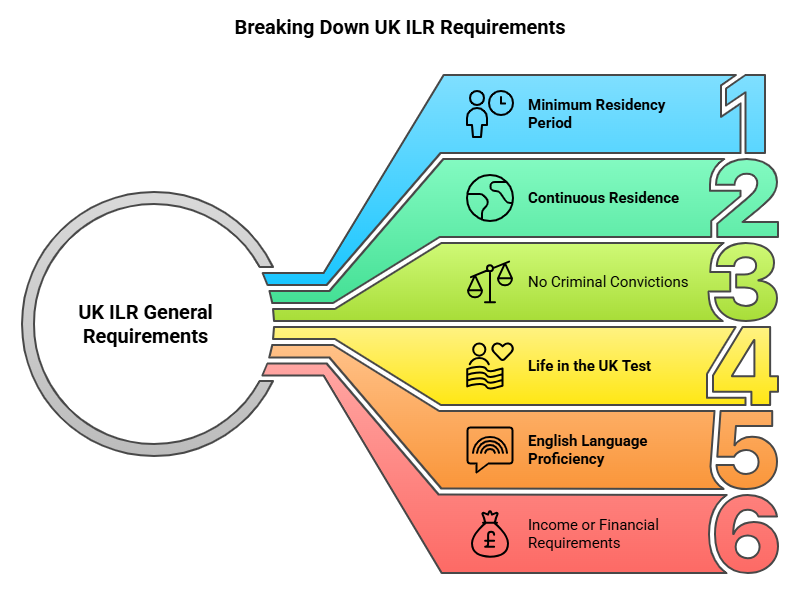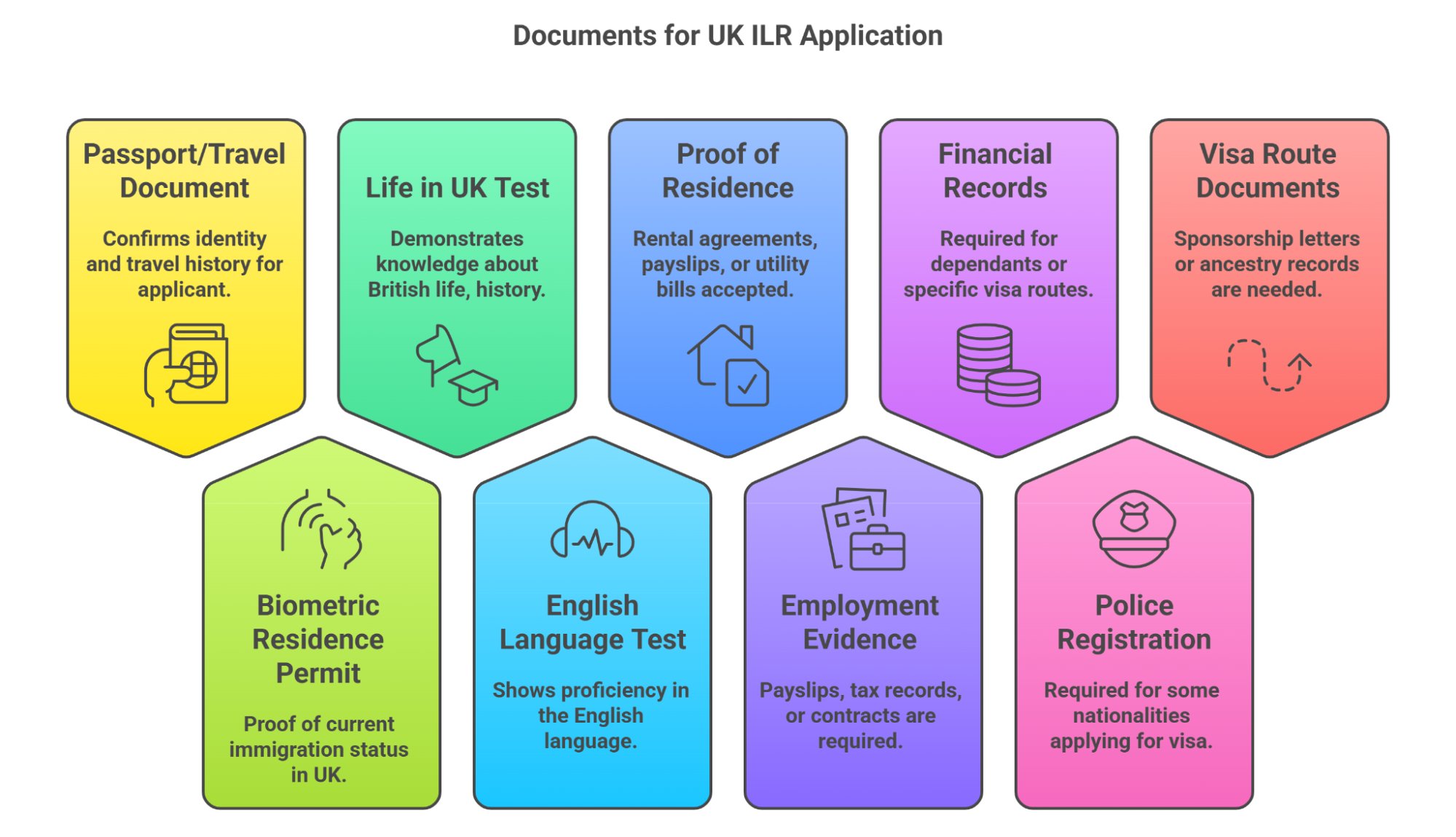Indefinite Leave to Remain (ILR) is the UK’s version of permanent residency. It allows individuals who have been living legally in the UK for a qualifying period to settle permanently. Once granted, you can live, work, and study without time restrictions and eventually apply for British citizenship. The requirements and application process for ILR vary depending on the visa category you currently hold.
✅ What Is Indefinite Leave to Remain?
ILR grants a person the right to stay in the UK without any immigration limitations. It's often the final step before applying for naturalisation as a British citizen.
Understanding Indefinite Leave to Remain
ILR signifies that you are free from immigration time limits in the UK. While it doesn't make you a British citizen, it provides many of the same rights and allows you to live permanently in the country. After holding ILR for a certain period (usually 12 months), you may be eligible to apply for British citizenship through naturalization.
⏳ Who Can Apply for ILR?
Eligibility for ILR depends on your current visa type and the length of time you’ve lived in the UK. Common routes include:
|
Visa/Route |
Qualifying Period |
Notes |
|
Skilled Worker Visa |
5 years |
Must meet salary and employment requirements with a licensed sponsor. |
|
UK Ancestry Visa |
5 years |
Must show continuous work/self-employment and proof of ancestry. |
|
Spouse/Partner Visa |
5 years |
Must meet relationship and financial requirements; includes civil partners. |
|
Long Residence (any lawful stay) |
10 years |
Must show continuous and legal residence in any combination of visa types. |
|
Tier 1 (Investor/Entrepreneur) |
2–5 years |
Time depends on investment or business performance thresholds. |
|
Innovator Founder Visa |
3 years |
Requires endorsement and evidence of business success. |
|
Global Talent Visa |
3–5 years |
Accelerated route available for top global talent in eligible fields. |
|
Refugee or Humanitarian Protection |
5 years |
ILR application follows after 5 years of granted protection. |
|
Retired Persons of Independent Means |
5 years |
Rare category; must prove financial independence without working. |
|
Other bespoke routes |
Varies |
Includes cases like HM Forces, Commonwealth citizens, etc. |
📋 UK ILR General Requirements
Regardless of visa category, you must typically meet the following criteria:
- Minimum residency period (usually 5 years) – You must have legally lived in the UK for a certain number of years—typically 5—before you can apply for ILR.
- Continuous residence with limited time outside the UK – You should not have spent more than 180 days outside the UK in any 12-month period during your qualifying residency.
- No serious criminal convictions – You must have a clean criminal record and not have breached UK immigration laws.
- Passed the Life in the UK Test – You need to show your knowledge of British history, culture, and laws by passing a government-approved test.
- Proof of English language proficiency – You must demonstrate your ability to speak and understand English through an approved test or qualification, unless exempt.
- Meet income or financial requirements (for some visa types) – Some visa categories require you to prove you earn enough or have enough savings to support yourself without public funds.

180–Day Rule with UK IRL
The 180-day rule for UK Indefinite Leave to Remain (ILR) refers to the requirement for continuous residence in the UK during your qualifying period (usually 5 years).
🔄 What the 180–Day Rule Means:You must not have been outside the UK for more than 180 days in any rolling 12-month period during your qualifying residency. This is calculated on a rolling basis, not calendar years. That means each 12-month period is counted backwards from the date of your ILR application. |
✈️ Exceptions for the 180–Day Rule:Absences for serious or exceptional reasons (like medical treatment, conflict, or natural disaster) may be allowed but must be well-documented. Work-related travel is usually acceptable if you're employed by a UK-based company and can show ties to the UK. |
🧪 Life in the UK Test
You will have to take the Life in the UK Test as part of your Indefinite Leave to Remain (ILR) application. It is a computer test that tests your knowledge of British history, traditions, laws, government, and daily life in the UK. The test is by multiple-choice questions and must be taken at a Home Office-approved test centre. Passing this test demonstrates that you have adjusted to British culture and are aware of its values and cultural background. It is well worth working hard with the official guide and sample questions available online.
📑 Documents Required for ILR Application
Here’s what you generally need when applying for ILR:
- Valid passport or travel document – to confirm your identity and travel history
- Biometric Residence Permit (BRP), if issued – proves your current immigration status
- Life in the UK Test pass certificate – required to demonstrate knowledge of British life
- English language test certificate (unless exempt) – to show English proficiency
- Proof of continuous residence – such as rental agreements, payslips, or utility bills
- Evidence of employment or self-employment – payslips, tax records, or contracts
- Financial records (if required) – particularly for dependants or specific visa routes
- Police registration certificate (if applicable) – required for some nationalities
- Other documents specific to your visa route – such as sponsorship letters or ancestry records

💻 How to Apply for ILR
The process for applying for ILR generally involves the following steps:
- Complete the Online Application: Apply through the UK Official website.
- Pay the Application Fee and Book a Biometric Appointment: Attend an appointment at a UKVCAS service point to provide fingerprints and photos.
- Upload Supporting Documents: Documents can be scanned and submitted digitally through the UKVCAS system.
- Wait for a Decision: Standard processing takes up to 6 months, but priority services can speed up decisions.

📆 When Can You Apply for ILR?
You can apply for Indefinite Leave to Remain (ILR) as early as 28 days before you complete your qualifying continuous residence period in the UK—typically 5 years, depending on your visa category. The early application window allows you to finalize your status just in time for when your visa is set to expire, reducing any gap in your lawful residence. It is essential to correctly calculate your eligibility date since applying too soon can lead to the rejection of your application. Always refer to the individual requirements associated with your visa route prior to making your application.
🚫 Common Pitfalls to Avoid when Applying for ILR
Applying for Indefinite Leave to Remain (ILR) can be complex, and small errors may result in delays or refusals. Below are common mistakes to avoid during the process:
- Gaps in employment or long absences from the UK: These can raise questions about your continuous residence and may breach the 180-day rule, which can disqualify you from ILR eligibility.
- Incorrect or missing documentation: Failing to include required documents (such as proof of residence, financial records, or identity papers) may result in an automatic rejection.
- Failing the Life in the UK or English test: These are mandatory for most ILR applicants. You must pass both before submitting your application unless you are exempt.
- Applying too early or too late: Applying more than 28 days before completing your qualifying period or after your visa expires can lead to a refusal or loss of legal status.
- Criminal or immigration offences: Any record of serious offences or breaches of immigration laws can significantly impact your eligibility or lead to a rejection.
👨👩👧👦 Can Family Members Apply for a UK ILR?
Yes, eligible family members can apply, including: Spouse or civil partner, Unmarried partner and Dependent children
🕒 They must have lived in the UK for the qualifying period—usually 5 continuous years as your dependants.
📋 Each person must apply separately, even if applying at the same time.
|
📚 Adults must pass: The Life in the UK Test English language requirement (unless exempt) |
📁 They must show: Proof of residence Proof of relationship to the main applicant No breaches of immigration conditions |
🍼 Children born in the UK may be eligible to register as British citizens after a parent is granted ILR.
🪪 What Happens After ILR?
With ILR, you:
- Can live and work in the UK indefinitely
- Are not subject to immigration control
- Can access public funds (if eligible)
- May apply for British citizenship after 12 months, provided you meet naturalisation requirements
🏠 Losing ILR While in UK
ILR status can be lost if:
- You leave the UK for more than 2 years (unless holding a returning resident visa)
- You are deported or found to have obtained ILR fraudulently
Important Considerations
Start Preparing Early: It is advisable to start gathering your documents and preparing for the Life in the UK and English language tests well in advance of your eligibility date.
Accuracy and Completeness: Ensure all information provided in your application is accurate and that you include all the required supporting documents. Incomplete or inaccurate applications can lead to delays or refusal.
Continuous Residence: Keep a detailed record of your entry and exit dates from the UK to accurately calculate your continuous residence and ensure you haven't exceeded the permitted absences.
Changes in Circumstances: If your circumstances change during the application process (e.g., change of address, criminal charges), you must inform UKVI immediately.
Legal Advice: If you have a complex immigration history or are unsure about any aspect of the application process, seeking advice from an experienced immigration lawyer is highly recommended.
📌 Final Tips for UK ILR Applicants
Applying for Indefinite Leave to Remain is a major step towards settlement in the UK, so preparation is key. Following these tips can help ensure a smoother and more successful application process:
- Keep records of travel dates and absences
- Maintain consistent employment and residence documentation
- Check the latest rules on the official sites before applying
- Consider legal advice if your case is complex
- Double-check your application for errors before submission
- Prepare for the Life in the UK and English tests early
Frequently Asked Questions
No. Once you’ve submitted your ILR application and biometric information, you should not travel outside the UK until a decision is made. Doing so may lead to your application being withdrawn automatically.
To maintain eligibility for ILR, you must not have spent more than 180 days outside the UK in any 12-month period during your qualifying residency. Some exceptions apply (e.g., for work-related absences).
Yes. ILR can be lost if you leave the UK for more than 2 continuous years, commit a serious crime, or obtain your status through deception. Re-entry may require a Returning Resident visa.
No. ILR is permanent residency, while citizenship grants you a British passport and full political rights. You may apply for citizenship after holding ILR for 12 months, depending on your circumstances.
Not directly. Time spent on a Student Visa does not usually count toward the 5-year ILR requirement unless applying under the 10-year long residence route.
You must apply online via the official website, pay the fee, and attend a biometric appointment. You’ll also upload documents and may be asked for additional evidence during processing.
Content Disclaimer: While this information was last updated in January 2026, we strongly suggest confirming all travel details with the appropriate governmental agencies, embassies, and airlines.
